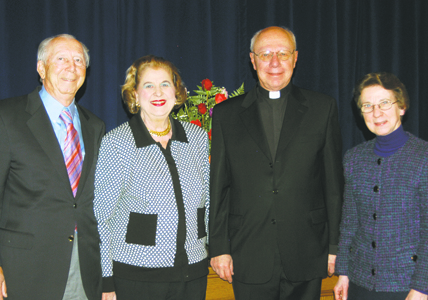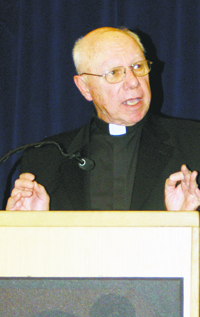
by Marie Elena Giossi
By putting himself at the service of God’s Word, the Eucharist and love, Pope Francis may be able to promote greater communion and unity among the world’s Christian churches, according to one local theologian.
Msgr. John J. Strynkowski, rector of St. James Cathedral-Basilica, Downtown Brooklyn, and former theological adviser for the U.S. Conference of Catholic Bishops, said this would lead to greater credibility, mutual understanding and better living together.
Guest lecturer for the 2013 Khatib Chair in Comparative Religion at St. Joseph’s College, Msgr. Strynkowski delivered the chair’s fifth annual lecture, “The Search for Christian Unity: A Fading Dream or a Potent Reality?,” at the Clinton Hill campus March 20.
“The theme for this year is unity and diversity in the Christian churches,” said Dr. Thomas Petriano, the college’s religious studies chair. “Msgr. Strynkowski was chosen (for the chair) because he is a highly respected theologian with extensive experience in ecumenical dialogue.”
Msgr. Strynkowski, who has participated in Catholic dialogues with Anglican, Methodist and Orthodox churches and worked extensively with theologians of other faiths, also serves as diocesan vicar for higher education.
In his talk, Msgr. Strynkowski said that “elements of sanctification and truth” are not exclusive to the Catholic Church. In fact, all Christian churches have common elements, or forces that push Christians closer together, such as the Scriptures, rituals (sacraments) and faith.
“These are forces impelling toward unity,” he said. “The fact is we have much more in common than what separates us,” he said.
In ecumenical dialogue among Catholic, Lutheran and Anglican scholars, he noted that there has been a growing convergence in regard to the universal primacy of the bishop of Rome and the acknowledgement that Christianity needs a single spokesperson.
In defining his role as bishop of Rome, Msgr. Strynkowski noted that it is significant that the new pontiff chose to be named after St. Francis of Assisi, a figure “universally admired by Christians and non-Christians alike.”
Thus far, it seems the Holy Father is emulating the simple life of the saint, and in doing so, he is keeping with the simpler papal style that has been adopted over the past 50 years.
The primacy of the bishop of Rome was long seen as monarchical with much pomp and circumstance, which Msgr. Strynkowski witnessed as a seminarian in Rome during the 1960s.
However, that has changed dramatically, he said, with “a humanizing of the papacy.” The image of the pope has shifted from a regal figure with a huge papal court under Pope John XXIII to a humble servant who pays his own hotel bill under Pope Francis.

Pope Is Not an Isolated Figure
The impetus for this change, monsignor said, came from the Second Vatican Council, which made it clear that the pope is not an isolated figure but someone who lives in relationship with other bishops, the Church and the world.
Since Vatican II, the papacy has become less removed and more connected to the rest of the Body of Christ and the world. He said this has been brought about by the pope putting himself at the service of the primacy of the Word as revealed in the Scriptures; the primacy of the Eucharist, the prime sacrament; and the primacy of love.
Msgr. Strynkowski concluded that the more the pope lives at the service of these three primacies, and affirms their importance, the greater credibility the Catholic Church will have and the greater the possibility of achieving communion among the Christian churches.
“His lecture was a clear, convincing, and impassioned call to appreciate the essential elements of unity that all Christians share,” Dr. Petriano said following the talk.
He felt the monsignor’s “analysis of the recent election of Pope Francis as having the potential to bring Christian churches into deeper communion” was both “inspiring and hopeful.”
“His talk was very substantial but very clear,” agreed attendee Mary Ann Haick DiNapoli, parishioner of the Melkite Church of the Virgin Mary, Park Slope. “He had wonderful insights into the papacy and into the role of the pontiff in this quest” for Christian unity.
She agreed with Msgr. Strynkowski that Christians have more in common than what separates them, and she particularly liked his “emphasis on the primacy of love.”
Dr. Ronna Feit, an alumna with a lifelong interest in ecumenism, said she never thought of the role of the pope from the perspective presented by Msgr. Strynkowski.
“It’s an important change for the pope to reach out to people,” she said in regard to the humanization of the papacy, “and to be more inclusive of people on all levels of society.”
Msgr. Strynkowski will deliver the same lecture on the Patchogue, L.I., campus April 9 at 7:30 p.m.
Funded by Dr. Reza Khatib, a Muslim, and his wife, Georgianna Clifford Khatib, ’52, a Catholic, the chair’s aim is to promote interfaith dialogue. Each spring, the college hosts a scholar who teaches a course, leads faculty discussions and offers a lecture.
“Each year has been a new gift to the college,” said Sister Elizabeth Hill, C.S.J., college president, addressing the nearly 150 students, faculty, alumni and guests in attendance.
The Khatibs sat in the front row along with Msgr. Edward Breen, and his sister Irene, a classmate of Georgianna Khatib.
Pointing to the Khatibs’ interfaith marriage as a model of “mutuality, respect and love,” Sister Elizabeth told students that the annual lecture series was established “to provide you with inspiration to live lives of integrity … and prepare you to serve the world.”
Past lecturers, including Imam Feisal Abdul Rauf, Dr. Margot Badran, Dr. Chung Hyun Kyung and Rabbi Gary Bretton-Granatoor, have focused on Islam, Buddhism and Judaism.
